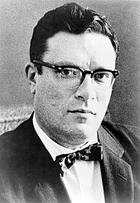
Isaac Asimov (aɪzək æzəməf; in Russian Айзек Азимов -Áyzek Azímov-, original name: Исабок Юдович Озимов -Isaak Yōvetvich Ozímov-Petróvichi, RSFS of Russia, December 20, 1919Jul / 2 January 1920greg.-New York, United States United, April 6, 1992) was a writer and professor of biochemistry at the University of Boston School of Medicine of Russian origin, nationalized American, known for being a prolific author of works of science fiction, history and scientific popularization. Asimov, too, had extensive knowledge of the natural sciences as a whole. Asimov's most famous work is the Saga of the Foundation, also known as Trilogy or Trântor Cycle, which is part of the Galactic Empire series and later combined with his other great series on robots. He also wrote works of mystery and fantasy, as well as a lot of non-fiction texts. In total, he signed more than 500 volumes and some 9,000 letters or postcards. His works have been published in 9 of the 10 categories of the Dewey Classification System. Asimov, along with Robert A. Heinlein and Arthur C. Clarke, was considered in life like one of the "three great" writers of science fiction. Most of his books of divulgation explain the scientific concepts following a historical line, backtracking as much as possible to times when the science in question was in an elementary stage. It often provides the nationality, dates of birth and death of the scientists it mentions, as well as the etymologies of technical words. Asimov was a member of Mensa for a long time, whose members he described as "intellectually combative." He enjoyed more than the presidency of the American Humanist Association, an organization of atheistic ideology. In 1981 an asteroid, the (5020) Asimov, was named in his honor.




